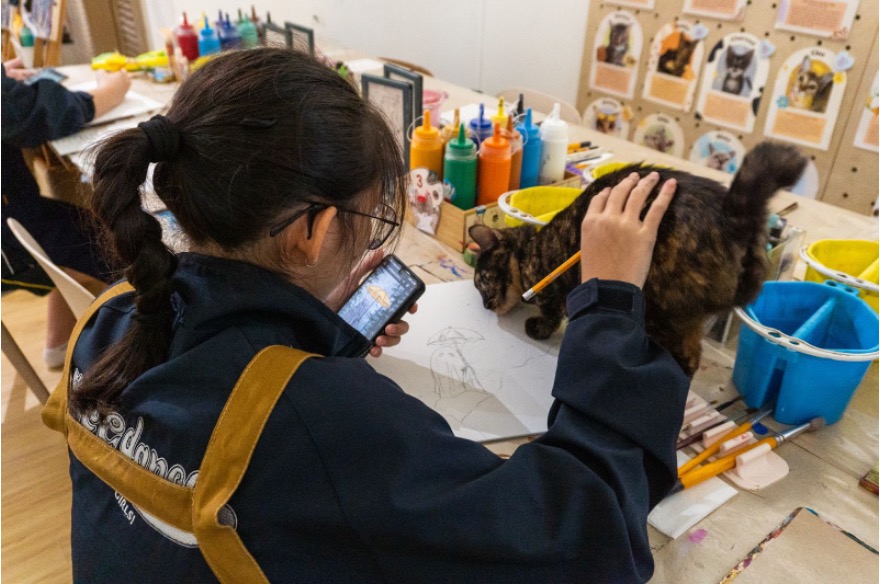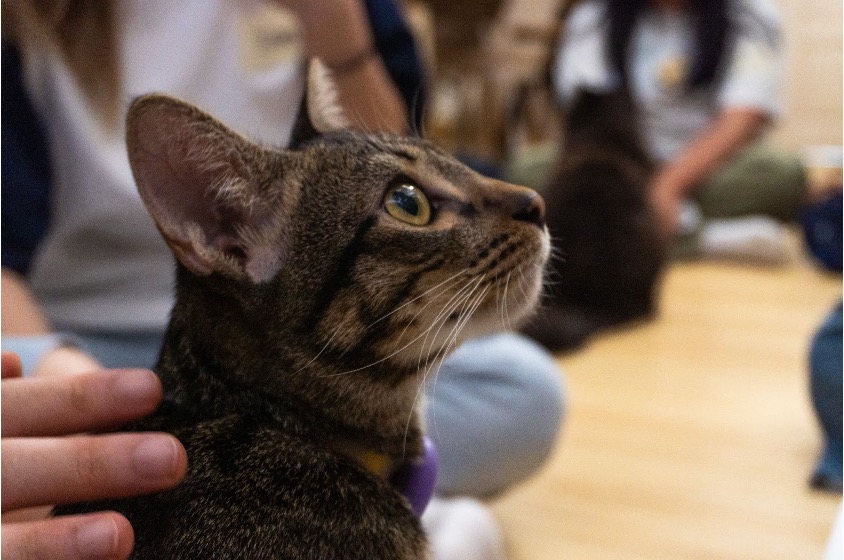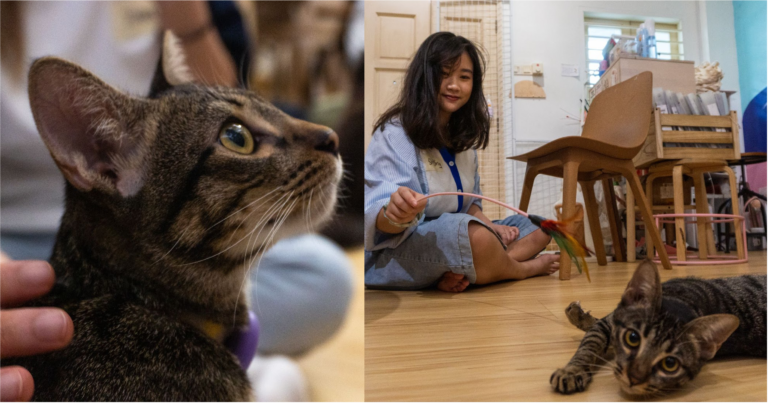It’s been a few years, but memories of the Covid-19 pandemic are still fresh in the minds of many.
During these dark days of the circuit breaker, what helped many Singaporeans get through these difficult times was their pets.
Whether furry and fluffy, smooth and scaly, or just cute to look at, having a pet lifts our spirits when we need a boost the most.
A survey carried out in Singapore a year into the pandemic, 89 percent of respondents agreed that their pets had a positive impact on their mental health.
It was therefore perhaps not surprising that SHINE Children and Youth Services turned to Furry Friends in its efforts to support the mental wellbeing of Singapore’s youth.
Called “Just Fur Fun” (JFF), it is an animal-assisted care program supported by the National Youth Fund (NYF) and the Tan Chin Tuan Foundation that aims to provide mental health support to young people aged 15 to 25.
The National Youth Fund by the National Youth Council supports youth sector organizations to champion youth initiatives and innovations that create social change.
Improved mental health
I asked Shi Ying, a 22-year-old volunteer and NUS student, how cats factored into her work.
“I believe that animals and humans can form special bonds that humans cannot always afford each other. Hopefully this can help young people relax in this space and feel a sense of camaraderie with the cats while talking about their mental health.
Shi Ying is a former intern at SHINE and has seen first-hand the time, care and effort the organization puts into creating successful and fulfilling opportunities for volunteers and beneficiaries.
Volunteers engage young participants during sessions, explore mental health topics like understanding emotions and self-care, and help them practice coping strategies.
“I think SHINE truly nurtures a culture of growth, caring for each other and kindness,” she said, adding that volunteering at SHINE gives her an opportunity to learn and a chance to give back.
But why mental health in particular?
“The topic of mental health has always been close to my heart,” said Shi Ying.
“I believe everyone has had mental health issues at one point or another in their lives, but not everyone has the opportunity to talk about it, address these issues and heal,” she added.
Through her work, Shi Ying hopes to inspire people to discuss mental health in a way that helps them and the community grow.
Cats
Shi Ying also highlighted what she calls a “wealth of research literature” compiled by SHINE to show the benefits of animal-assisted activities.
I turned to SHINE social worker Natasha Lim for more information.
“Animals are seen as non-judgmental and non-threatening, offering complete, unconditional and positive respect to humans,” she said.
SHINE, a nearly 50-year-old organization, launched its youth mental health service (ResiL!ence) in 2020.
It has been observed that due to issues such as social stigma towards mental health and relative lack of options, young people may be unsure of how to care for their mental health or delay seeking help. help.
SHINE therefore intervened, with the aim of making mental health services more accessible and more affordable for young people.
“Just Fur Fun” is just the latest in their efforts.
It all started when SHINE staff members noticed that they were all pet owners, especially cats.
This led to a literature review that revealed the benefits of animal-assisted approaches.
Lim cited studies that found the presence of animals could also support therapeutic engagements.
This helps the social worker appear more trustworthy and makes it easier for young people to participate by making them feel more comfortable.
 Image via SHINE.
Image via SHINE.
Some benefits of participating in such programs include a reduction in perceived stress and anxiety, while boosting self-esteem.
This can be seen even during brief interactions with furry creatures.
And when people are less stressed, they are more likely to be open to communication and build a relationship with their social worker or volunteer.
A “mini-pilot” program was conducted in December 2022 and proved popular with young people.
Therefore, SHINE continued to do more research to design a more structured program.
They currently have six groups operating simultaneously.
In one such group, in partnership with a secondary school, the teacher said that as a mainstream teacher she had known a particular group of students for around three years and had a good relationship with them. However, the JFF sessions allowed her to learn more about the students and deepen her understanding of some of their mental health issues.
Through the JFF sessions, she had more time and space to hear about students’ struggles and challenges. Therefore, she appreciated the safe space that JFF created for everyone.
Over the four sessions, the group developed a sense of comfort and trust with each other and with the facilitators, as they shared their vulnerabilities. They encouraged each other while learning new ways to better manage their challenges.
Through JFF and the help of dedicated facilitators and four-legged friends, a safe and relaxed environment was created for participants to talk more freely about their mental health issues, find support and be more open to seeking help from professionals.
Take care of cats
Of course, involving animals means they need to be properly cared for.
Lim shared that SHINE sought advice on ethical practices from the cat cafe they work with, Wildflower Studio.
They also conducted their research by consulting publications from reputable journals on animal-assisted activities and their relationship to mental health.
“Through our research and advice, we gathered information from people more educated than us,” Lim said. SHINE organized session plans and training programs for staff and volunteers.
And so far it seems to be working.
“From our experiences so far, young people enjoy having time to interact with cats. It is evident that young people experience a certain kind of joy and calm when socializing with cats. They also share that they have a lot of fun with the cats.
Not only does this benefit the young, but the cafe cats also have time to socialize with humans and become more comfortable with touch. Which improves their adoption process as they learn that humans can be friends. It’s kind of like a win-win situation for both.
 Image via SHINE.
Image via SHINE.
Importance of mental health support
Although Covid-19 has been a terrible and tragic experience for everyone, the positive side has been that society has become more open to discussing mental health.
“I believe the awareness that mental health is health has improved significantly,” Lim said. However, because it is a broad topic, unfortunately it is also easy to find misinformation about mental health.
It is therefore important to turn to credible and reliable sources who have experience in dealing with such issues.
Lim encourages the public to continue to be open to learning more about their mental health. And who knows, you might want to volunteer.
“It’s wonderful to see more and more people from all backgrounds signing up to volunteer with us as part of our team in recent years, who hope to help raise awareness of mental health and learn the skills needed to support people with mental disorders. health needs. »
Similarly, Shi Ying views volunteering as a way to connect with the community and “pay it forward.”
“As someone who has received support from the community, I hope I can dedicate my time and energy to helping where I can.” In this case, JFF also allows me to travel, even for a short time, with the participants and the cats and hopefully make these short sessions something we can all remember.
If you would like to learn more about ResiL!ence@SHINE, you can visit their website at https://www.shine.org.sg/resilienceor follow their Instagram account, @ministryofmental.
You can also contact here for mental health support.
Carers can contact us via WhatsApp on 8877 8728, and young people seeking help can send a WhatsApp message to 9740 1489.
If you are part of a youth sector organization and looking to champion your own youth initiative, find out about the National Youth Fund Today.
This is a sponsored article brought to you by the National Youth Council.
Top photo from SHINE Children and Youth Services.
